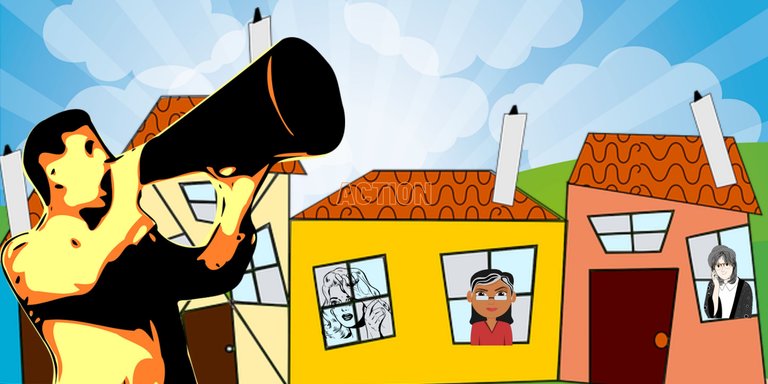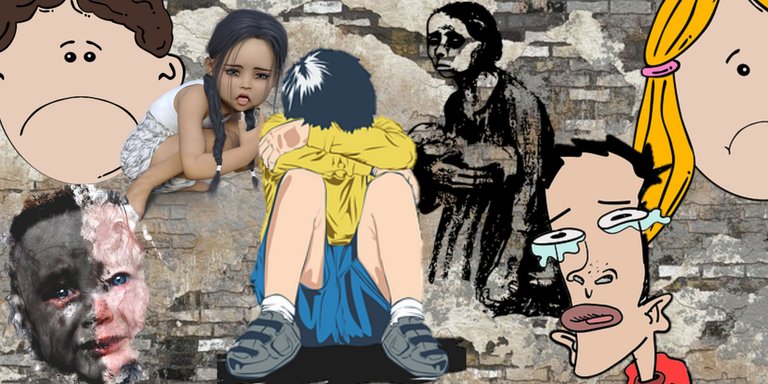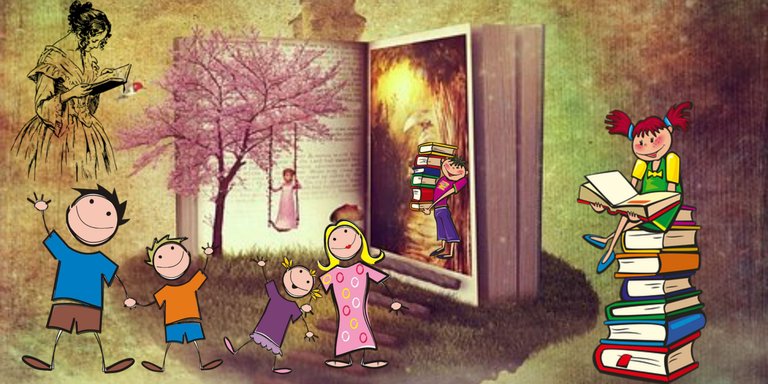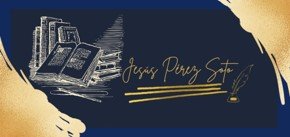

Cambio de niños / Change of children
“¡Cambio niños malos por niños buenos!, ¡oferta!, ¡aprovechen!, dos buenos por uno malo, ¡aprovechen!”
Así gritaba el mercader que llegó aquel domingo al pueblo y en seguida a los padres se le abrieron sus orejotas de elefantes, y uno dijo:
—Yo tengo uno que es ciego, que cuando le pido que colabore recogiendo la basura, mira para todos lados, pero sigue como si nada. ¡Hey! ¡señor mercader!, ¡venga!, ¡venga! que yo tengo uno con los ojos dañados.
Y una señora que tenía rato llamando a su hijo, pensó:
—Yo tengo una hija que no escucha y eso que es orejona, cuando la llamo se vuelve más sorda, mi hija está mal, ¡la cambio!, ¡la cambio!
Y otra que siempre necesitaba ayuda porque ya estaba mayor:
—Al mío no le sirven las manos, no arregla su cuarto ni lava el plato, no me ayuda, yo tengo las manos vueltas un mar de callos y él ni siquiera sabe qué es un callo. Lo cambio, además me darán dos que serán cuatro buenas manos.
Fueron cambiando a los niños: al que no escuchaba, a la que no veía, al que hablaba palabrotas y hasta a la que olía muy bien la comida, pero si había que ayudar se le iba el hambre.
"I'll trade bad kids for good kids, bargain, take advantage, two good for one bad, take advantage!"
So shouted the merchant who arrived that Sunday in the village, and immediately the elephant ears of the parents opened, and one said:
—"I have one who is blind, and when I ask him to help me by picking up the garbage, he looks everywhere, but goes on as if nothing. Hey, Mr. merchant, come, come, I have one with damaged eyes.
And a lady who had been calling her son for a long time, thought:
—I have a daughter who does not listen, and she is a big ear, when I call her she goes deaf, my daughter is bad, I'm going to change her, I'm going to change her!
And another one who always needed help because she was already old:
—Mine doesn't use his hands, he doesn't tidy his room or wash the dishes, he doesn't help me, my hands are like a sea of calluses and he doesn't even know what a callus is. I change him, besides, they are going to give me two that will be four good hands.
They changed the children: the one who did not listen, the one who did not see, the one who spoke badly and even the one who smelled the food very well, but if he had to help, he went hungry.

Cambiaron a todos los niños, bueno, menos a Leona, que en realidad se llamaba Leonor, pero como se la pasaba leyendo su mamá le decía Leona, en honor a la lectura. El mercader llegó a casa de la madre a cambiársela, pero ella le dijo:
—Yo no la cambio, leer no tiene nada de malo. Mi Leona tendrá un cerebro fuerte, con un rugido atronador y siempre sabrá tomar decisiones.
—Pero pierde mucho tiempo leyendo, señora, cámbiemela y le daré dos que le ayudarán con los fastidiosos oficios del hogar.
El mercader se fue sin Leona y para todos Leona se convirtió en la niña mala del pueblo, a la que no habían cambiado, se burlaban de ella porque todos eran buenos y ella solo era una lectora.
They changed all the children, well, except Leona, whose name was actually Leonor, but since she spent her time reading, her mother called her Leona, in honor of reading. The merchant went to his mother's house to change Leona, but she said, "I won't change her:
— "I won't change her, there's nothing wrong with reading. My Leona will have a strong brain, with a thunderous roar, and will always know how to make decisions.
—But she wastes too much time reading, madam, change her and I'll give you two that will help you with the tiresome household chores.
The merchant left without Leona, and to everyone Leona became the bad girl of the village, the one who had not been changed, they made fun of her because everyone was good and she was only a reader.


Un día, a uno de los niños se le cayó un brazo, su papá se lo cosió para evitar que lo vieran así. Después a otro se le desprendió un ojo, pero su mamá rápidamente se lo pegó. La siguiente semana a Luis se le desaparecieron las orejas, a Marta se le fue la voz y todos empezaron a perder pedazos. Al principio los papás no dijeron nada, tenían vergüenza porque los habían engañado, ya ni siquiera los enviaban a la escuela, no querían que vieran a sus hijos defectuosos. Solo Leona iba a la escuela, pero como le hacían falta sus amigos, se aburría.
Nadie quería comentar hasta que un día la mamá de la niña orejona, la señora que vivía pensando, dijo:
—Eso no se puede quedar así, hay que ir detrás del mercader para que devuelva a los niños, pero ya han pasado tres meses y quién sabe dónde irá ese bribón.
Otra señora dijo:
—Ya que lo niños están feos, que alguien se los lleve y los cambie a su vez por otros que sean sordos, ciegos o mudos, pero que nos quieran, que vayan a la escuela y…
—¡Que lean! —interrumpió Leona que acababa de llegar con su mamá— Yo sé lo que sucede —les dijo a todos— los niños fallan porque olvidaron la lectura; como no tocan los libros se le caen las manos, como no leen cuentos se le oxidan los ojos, como no escuchan poesía se le secan los oídos y como no les piden libros de regalos, se les cae la lengua.
One day, one of the children's arm fell off, and his father sewed it back on to prevent them from seeing him like that. Then another one's eye fell out, but his mother quickly glued it back on. The next week Luis' ears disappeared, Marta's voice went, and they all began to lose pieces. At first the parents didn't say anything, they were ashamed because they had been cheated, they didn't even send them to school anymore, they didn't want them to see their defective children. Only Leona went to school, but because she missed her friends, she was bored.
No one wanted to comment until one day the mother of the little eared girl, the lady who lived thinking, said:
—That can't stay like that, we have to go after the merchant so that he returns the children, but three months have already passed and who knows where that rascal will go.
Another lady said:
—Since the children are ugly, let someone take them away and exchange them in turn for others who are deaf, blind or mute, but who love us, who go to school and.....
—Let them read! -interrupted Leona who had just arrived with her mother- I know what happens -she told them all- children fail because they forgot to read; as they don't touch books their hands fall off, as they don't read stories their eyes rust, as they don't listen to poetry their ears dry up and as they are not asked for books as presents, their tongues fall off.

La señora del mar de callos en las manos se fue a su casa, abrió un baúl, sentó a su hijo y empezó a leerle como si quisiera que la lengua se le hiciera callo. Otra señora se acostó con su hijo y no se durmieron hasta que de tanto leerle, al niño se le arregló el cerebro. Una tercera lo llevó al bosque y le contó historias de duendes y el niño aprendió a escuchar, una cuarta enseñó al suyo a ver, y una quinta, y una sexta, y una mil, y todas les leían a sus hijos, y en aquel pueblo todo empezó a ser nuevo, hasta los adultos que habían crecido feos por no querer leer.


GRACIAS POR SU LECTURA / THANK YOU FOR READING

Las imágenes fueron seleccionadas de Pixabay y editadas en Canva y en Power Point: megáfono, barrio, mujer, mujer, mujer,vector llanto, vector llorar,vector niña, vector triste, vector niña cara triste, vector niño madre,vector bebé llorando, fantasía libros, vector niño libros, vector libro, vector niños personajes.
Gran cuento @jesuspsoto . Un mensaje tan necesario para los chicos de hoy, tan de la tecnología enagenante. Maravilloso mensaje.
Más que para los chicos es un mensaje para los adultos que dejaron de leer y de leerle a sus hijos. Gracias por leer y comentar.
¡Eres un tesoro! Me alegra haberte encontrado, estoy fascinada con tus cuentos.
MARAVILLOSA IMAGINACIÓN!! Buena redacción y ortografía, y creativa manera de relatar los acontecimientos. Me encanta tu arte, un ejemplo a seguir :D
El niño que no tenía estatura. Un abrazo.@nioberojas eres muy expresiva. Gracias por pasar y quedarte a leer mis textos. Debo aclararte que si no fuera por mis intensos ratos de lectura no entrenara cada día a la imaginación, porque el creador debe aprender a entrenar sus talentos, su creatividad y aparte de leer hay que investigar y lo tercero, ser constante con la escritura. Te invito a leer
Me gusta la crueldad del cuento y el mensaje. Disfruté leyendo. Saludos!
La literatura sirve para recrear a realidad hasta en su más dura crueldad, pero también nos sirve para decirnos cómo menguar esa dureza. Gracias por leer y comentar, @juniorgomez.
Éste es el más sabio de los tres. La sociedad se viene abajo por ignorancia y falta de moral, y está difícil de enmendar; el mundo no volverá a ser lo mismo, ni algo similar.
Por cierto, hay un error después de la segunda imagen ("se le se cayó" en vez de "se le cayó")
De nosotros depende que el mundo siga avanzando o retrocediendo.
Oye, no veo el error, ahora mismo lo estoy buscando y nada. Cayó, del verbo caer, es con y. Porque calló del verbo callar es con ll.
"se le se cayó un brazo". El segundo "se" está de más.
Ahora sí lo vi. Gracias, ya hice las correcciones. Eres muy amable.
Fue un gusto ayudar 🙂